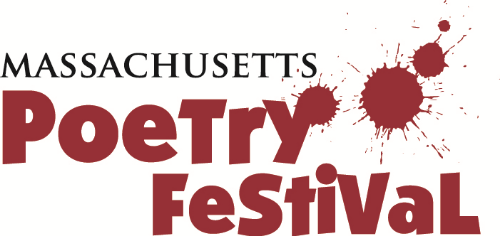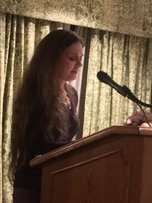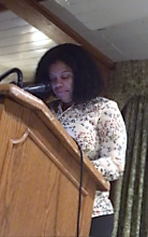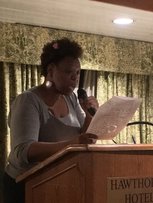Mothers Chat About The Muse at The Massachusetts Poetry Festival
by Toni Bee

On Sunday May 8, I was honored to be on the panel called "Motherhood and The Muse" at the 2017 Massachusetts Poetry Festival that took place in Salem, MA. It was hosted by Chad Parenteau, a cis-white-male, who is the host of Stone Soup Poetry in Cambridge - a 46 year-old open mic poetry forum. This was Chad’s third time hosting a panel at the annual fest and my second time presenting on one of his panels.
I have noticed Chad - who looks to be the epitome of white and patriarch- uses his position of power to enhance the visibility of poets from other cultures, the feminist and LGBTQ communities and The Black Lives Matter movement. Parenteau does not have to use his privilege in such a way but he chooses to. The fear that he will be “overtaken” by women and colorful people is not a fear evident in Chad’s personality; it is a quality in him that I have noticed ever since we became acquainted.
Chad had a desire for unity in Boston’s poetry society and in 2012 he told me, “I want more people coming to Stone Soup. Frankly it’s so...white” Ever since that time, I witnessed Chad intensely more engaged with Boston’s poetic communities of color - and I have seen him using his Stone Soup Open Mic to showcase Black poets, and those who identify with other cultural distinctions - not readily accepted by mainstream predominantly white male & female poetic forums. The diverse ladies he featured on the panel at Hawthorne Hotel - two “black” and one “white”- are in some ways the epitome of Chad’s goal of culturally expanding his own poetry forum and universe.
Parenteau interviewed the ladies of the Motherhood and The Muse panel and they were:
DiDi Delgado - present with her 5 month-old Egypt on her lap,- is a leader in Black Lives Matters Cambridge, co-directs S.O.U.P - Society of Urban Poetry, and is an advocate for the LGBTQ community.
Rene Schwiesow is an poetry editor, reviewer, clinical therapist, and mother of two sons. She also hosts Poetry: The Art of Words in Plymouth, Masschusetts.
Toni Bee has a 15 year old daughter, is a storyteller, teaching artist, event host, and is also the first woman elected as Poet Populist of Cambridge, MA, 2011-213; Bee is the city’s 2016 Inaugural Poetry Ambassador and she helped cofound Black Lives Matters Cambridge.
Below are direct quotes, with some paraphrase, from what was covered during the question and answer hour. I wrote notes of that communication while seated on the panel and although I could not collect my own responses, with assistance from my partner who attended the event, I added my remembered replies.
Here is the conversation that expounds upon how women who write balance raising kids; the drive behind their poetic work and how having a child affects their poetry and lifestyle.
How does being a Mom affect your creative muse? What have you had to do to adjust your poetic lifestyle to being a parent?
I have noticed Chad - who looks to be the epitome of white and patriarch- uses his position of power to enhance the visibility of poets from other cultures, the feminist and LGBTQ communities and The Black Lives Matter movement. Parenteau does not have to use his privilege in such a way but he chooses to. The fear that he will be “overtaken” by women and colorful people is not a fear evident in Chad’s personality; it is a quality in him that I have noticed ever since we became acquainted.
Chad had a desire for unity in Boston’s poetry society and in 2012 he told me, “I want more people coming to Stone Soup. Frankly it’s so...white” Ever since that time, I witnessed Chad intensely more engaged with Boston’s poetic communities of color - and I have seen him using his Stone Soup Open Mic to showcase Black poets, and those who identify with other cultural distinctions - not readily accepted by mainstream predominantly white male & female poetic forums. The diverse ladies he featured on the panel at Hawthorne Hotel - two “black” and one “white”- are in some ways the epitome of Chad’s goal of culturally expanding his own poetry forum and universe.
Parenteau interviewed the ladies of the Motherhood and The Muse panel and they were:
DiDi Delgado - present with her 5 month-old Egypt on her lap,- is a leader in Black Lives Matters Cambridge, co-directs S.O.U.P - Society of Urban Poetry, and is an advocate for the LGBTQ community.
Rene Schwiesow is an poetry editor, reviewer, clinical therapist, and mother of two sons. She also hosts Poetry: The Art of Words in Plymouth, Masschusetts.
Toni Bee has a 15 year old daughter, is a storyteller, teaching artist, event host, and is also the first woman elected as Poet Populist of Cambridge, MA, 2011-213; Bee is the city’s 2016 Inaugural Poetry Ambassador and she helped cofound Black Lives Matters Cambridge.
Below are direct quotes, with some paraphrase, from what was covered during the question and answer hour. I wrote notes of that communication while seated on the panel and although I could not collect my own responses, with assistance from my partner who attended the event, I added my remembered replies.
Here is the conversation that expounds upon how women who write balance raising kids; the drive behind their poetic work and how having a child affects their poetry and lifestyle.
How does being a Mom affect your creative muse? What have you had to do to adjust your poetic lifestyle to being a parent?

Rene Schwiesow: “ For a period of time after my first son, I felt like I had to differentiate.” She felt like she, “Didn't want to loose her core self.” Rene said, “Over the years I came to look at every aspect of my life as poetry - it all served to feed poetry.”

DIDI Delgado: “Egypt was unexpected. The doctor said I would never have kids. I am happy I am a Mom - but before her my life was very active and I thought a baby would never fit in. My lifestyle has to revolve around her now. It is both - I am still and activist and host slams, travel - it just takes longer and I am more thoughtful and do things with intent. When she was in the womb, I was on the run.”
Delgado summarized by saying she believes you can do poetry and have an active life it just takes willing adjustment.
Delgado summarized by saying she believes you can do poetry and have an active life it just takes willing adjustment.

Toni Bee: “I have always incorporated poetry into my life - wrote wherever I went - so it was never an adjustment with my daughter. I remember writing in notebooks when we were at the homeless shelter. As she got older though and I got more active with poetry and community advocacy, I found I needed to make sure to sit down and capture my poetry. It was more my active involvements that took me from the writing - not my kid so much.”
How do your kids feel about the poems you write about them?
|
Bee: “I have to say, I do not write about my daughter that much - I have a few poems about her though. Maybe because she is the closest person to me and I don't want to expose that part of me to the world. Also I do not sit down and intentionally write poems about her. But I must start because the other day she asked/demanded, “Mommy you gonna write a poem about me?”
|
|
|
|
Schwiesow: “At home, I practice my poetry out loud. Lots of the time I’d be practicing and my oldest would yell - ‘you're talking to yourself again!' I’d be at their ballgame scribbling a poem. We sorta have become a writing family. My youngest son has concussions. When I write about that it is...challenging. I write but I don’t perform it until they see it.”
|
|
Delgado: DiDi mentioned that she has already coined poems about her baby and other aspects of her pregnancy.
"I don’t know what Egypt will think. She is taught very early on not to be in her silo. Egypt is going to be exposed to all these different people and things” |
|
What do you and what don’t you write about?
Schwiesow: “Slam. I’ve written but have not performed it. With slam everything comes up and spills to the page. I try to write everything because it’s release. I have topics that are off limits to share. I have written my kids graduation poems. It was a show of loosening the ties. There is a lot of stuff I write about my profession...but I’d never perform it.”
Delgado: “Danielle Legros-Georges has encouraged me to write more form. Slam is like going to the cinema. Sex, I write about it. I started to do it to free me from being prudent. We sexualize children. We [parents] have to frame our children. So there is no subject matter for me that’s off topic."
DiDi continued saying that people get in your business and that she chooses to keep her child close and will take time to expose Egypt to various cultures and lifestyles - but from Delgado’s perspective.
Bee: “I write when it hits me. I don’t often sit down and overtake a subject, unless I am crafting it for a purpose. Nature, love, a little family - but again I don’t want the world to know everything. And I don’t know how my Dad or Sis’ is going to feel about me writing ‘bout them and I wouldn’t probably share. You know this whole Black Lives Matter business - it is still going on. But when I was in the depth of it I couldn’t write poems about it. The pain was just too much and revisiting it - I couldn’t . Now that I have stepped back maybe I can - a bit. But I gotta do it with intent”
Who are some of your poetic influences?
Delgado: “Sonia Sanchez. She is world renowned. She shows you can do it and be successful at it. I heard somewhere, ‘The best mother poets are the ones we haven’t heard from.”
Schwiesow: Rene explained that there many professors who were awesome writers at her college and they are her influences. "They are unknowns, my professors” One she named was Tricia Currans Sheehan
Bee: "There are so many female poets they don’t tell us about. Like Lorde and Cortez. I had to find out about Audre Lorde and Jayne Cortez whose voice is slam, but she predates it or came out as simultaneous with it. She works with music too. Their voice is strong - and the world don’t tell us about them. Also Audre identified as a black lesbian and I think a mother too and different cultures have a tough time or aren’t willing to explain her story."
My last question is what are your other challenges as a mother especially in the new political world?
Schwiesow: “It has made me more vocal about domestic violence and rape. It goes back to exposing our children our way as DiDI was saying. I don’t feel constrained on it, I feel liberated from it. “
Delgado: ”I find white folks are leaning into their uncomfortable work. If you asked me what kind of world I would want Egypt to live in I would say; I want her to grow up in a world that when your kid runs into mine, [and some micro-aggression happens], that they talk about it right then and there. We hurt each other and I find when you ‘call someone out’ people are saying ‘it’s not my fault’ immediately because they are not in the position of pain. If someone hurts her, she can have a conversation and say she’s hurt and not with someone validating their feelings."
Bee: “All this newness frees me. I am sorta ok with our country’s new leader being real talk even though it's bigoted. It has made me and so many people release our voices. He is real talk so I can, we can be straight up with it to. It has made me push my fear aside and say the positive things I want to say. I even started my writing workshops again and did it for women. A lot of what people saying right now are to separate us. We all need to be in solidarity and I push that. We are in the center in this historic town. and they never acknowledge the people who originally lived here- but don’t no more -and the folks brought over here to work the land to make the town what it is today. I am free to write about the hidden stories from my perspective - on how our country was built and, I am going to push for that to come out more in my poems. This country was built by cultures of people who suffered genocide, who were stolen and enslaved, and at the start indentured peach folks too - the immigrants came later - or at that time they were our bosses. We all got mixed up. That’s who America is and we have to tell that story too."
Schwiesow: “Slam. I’ve written but have not performed it. With slam everything comes up and spills to the page. I try to write everything because it’s release. I have topics that are off limits to share. I have written my kids graduation poems. It was a show of loosening the ties. There is a lot of stuff I write about my profession...but I’d never perform it.”
Delgado: “Danielle Legros-Georges has encouraged me to write more form. Slam is like going to the cinema. Sex, I write about it. I started to do it to free me from being prudent. We sexualize children. We [parents] have to frame our children. So there is no subject matter for me that’s off topic."
DiDi continued saying that people get in your business and that she chooses to keep her child close and will take time to expose Egypt to various cultures and lifestyles - but from Delgado’s perspective.
Bee: “I write when it hits me. I don’t often sit down and overtake a subject, unless I am crafting it for a purpose. Nature, love, a little family - but again I don’t want the world to know everything. And I don’t know how my Dad or Sis’ is going to feel about me writing ‘bout them and I wouldn’t probably share. You know this whole Black Lives Matter business - it is still going on. But when I was in the depth of it I couldn’t write poems about it. The pain was just too much and revisiting it - I couldn’t . Now that I have stepped back maybe I can - a bit. But I gotta do it with intent”
Who are some of your poetic influences?
Delgado: “Sonia Sanchez. She is world renowned. She shows you can do it and be successful at it. I heard somewhere, ‘The best mother poets are the ones we haven’t heard from.”
Schwiesow: Rene explained that there many professors who were awesome writers at her college and they are her influences. "They are unknowns, my professors” One she named was Tricia Currans Sheehan
Bee: "There are so many female poets they don’t tell us about. Like Lorde and Cortez. I had to find out about Audre Lorde and Jayne Cortez whose voice is slam, but she predates it or came out as simultaneous with it. She works with music too. Their voice is strong - and the world don’t tell us about them. Also Audre identified as a black lesbian and I think a mother too and different cultures have a tough time or aren’t willing to explain her story."
My last question is what are your other challenges as a mother especially in the new political world?
Schwiesow: “It has made me more vocal about domestic violence and rape. It goes back to exposing our children our way as DiDI was saying. I don’t feel constrained on it, I feel liberated from it. “
Delgado: ”I find white folks are leaning into their uncomfortable work. If you asked me what kind of world I would want Egypt to live in I would say; I want her to grow up in a world that when your kid runs into mine, [and some micro-aggression happens], that they talk about it right then and there. We hurt each other and I find when you ‘call someone out’ people are saying ‘it’s not my fault’ immediately because they are not in the position of pain. If someone hurts her, she can have a conversation and say she’s hurt and not with someone validating their feelings."
Bee: “All this newness frees me. I am sorta ok with our country’s new leader being real talk even though it's bigoted. It has made me and so many people release our voices. He is real talk so I can, we can be straight up with it to. It has made me push my fear aside and say the positive things I want to say. I even started my writing workshops again and did it for women. A lot of what people saying right now are to separate us. We all need to be in solidarity and I push that. We are in the center in this historic town. and they never acknowledge the people who originally lived here- but don’t no more -and the folks brought over here to work the land to make the town what it is today. I am free to write about the hidden stories from my perspective - on how our country was built and, I am going to push for that to come out more in my poems. This country was built by cultures of people who suffered genocide, who were stolen and enslaved, and at the start indentured peach folks too - the immigrants came later - or at that time they were our bosses. We all got mixed up. That’s who America is and we have to tell that story too."
